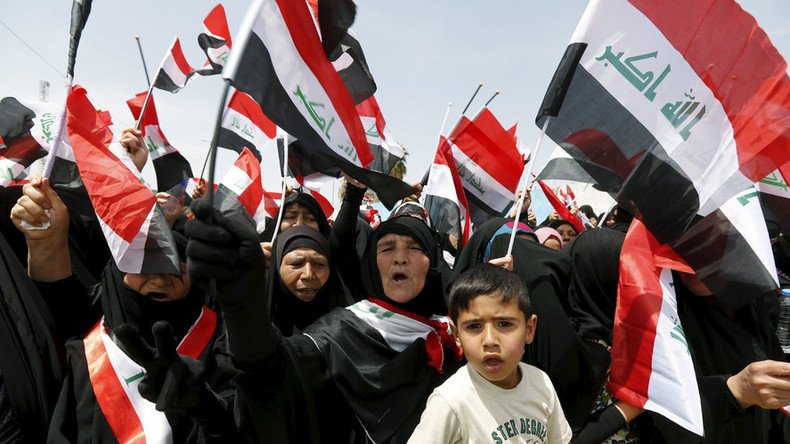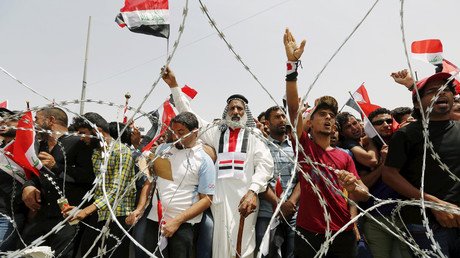‘Iraq unrest: Déjà vu all over again’ – Larry Johnson

The current situation in Iraq is reminiscent of the US trying to create a stable government in South Vietnam during the war in the 60s and 70s, which the Americans failed, says Larry Johnson, former CIA and State Department employee.
The leader behind the Iraqi protesters, the Shia cleric Moqtada Al-Sadr, said he is waiting for a greater uprising among the people in Baghdad. Moqtada Al Sadr is a Shia cleric and also the head of the militia group called the Mahdi Army that gained popularity after the US led invasion in 2003. He is known for his vocal anti-American sentiment.
Larry Johnson, former CIA and State Department employee, believes the situation is likely to be further destabilized. Recent terrorist attacks targeting Samawa city in Shiite-dominated southern Iraq will “further inflame the majority Shia population,” he said, adding that “Moqtada Al-Sadr does have a significant support there.”
Larry Johnson: I think what we are seeing I would call a déjà vu all over again. It is reminiscent of the US trying to create a stable government in South Vietnam during the war in Vietnam in the 60s and 70s. And despite our best intentions – or some might argue not so good intentions - we failed. And it is ultimately a decision that must be taken by people and there is no such thing as a single unified people in Iraq. The Shias, Sunnis and Kurds are really split. And I think we are going to wind up with a de facto split in that country. I mean, it is de facto right now and it may become de-jure as we go forward. Moqtada Al-Sadr is going to be a significant player. It ultimately boils down to the competence of the government, and the government at this point is being incompetent.
RT: Moqtada Al-Sadr is a vocal critic of America. How is this situation likely to play out for the US?
LJ: The US is going to be confronted with the reality they will not like and it comes at very inopportune time because we are in presidential election year. Barack Obama is an impotent president at this point – he has no real power. And he is not in a position to invest himself in such a way as to put at risk additional American resources on the ground in Iraq. I think it is just a reality of the situation on the ground that is going to rule the day. I think what that means is that at least in Baghdad and in part to the south, it will become a de facto Shia state and will have closer relations with Iran. The Sunnis to the west of Baghdad… are caught in a very hard position – caught between the dog and the fireplug because on the one hand, they are dealing with ISIS and other radical Islamic groups like Al-Nusra. And on the other hand, there are elements within the Sunni communities that don’t want to go that radical road. And they don’t really have anywhere to turn because they do not find a natural ally among the Shia faction in Baghdad. And Moqtada Al-Sadr, in particular - he doesn’t embrace or welcome the Sunni tribes. And the Kurds up north, they are receiving …US support; and they seem to be making some progress particularly against ISIS but that doesn’t necessarily extent over to the Sunnis. So, I think we are going to see this continuing fragmentation and chaos. And my rule of thumb is whoever has the best organization ultimately will prevail. And as I look at it, Moqtada Al-Sadr has the best position.
Dhia Al-Asadi, Iraqi MP:“The atrocities committed by ISIS are ascribed to the bad way the US dealt with the Iraqi problem. Without the intervention of the US this would not have been created – the whole deterioration in the security situation. All the problems that [followed] the invasion of Iraq, bring the US into accountability. The absence of security, the deterioration of [the] economy, the financial crisis, all of the other problems at the top of which now is ISIS – the US bears the responsibility.”
The statements, views and opinions expressed in this column are solely those of the author and do not necessarily represent those of RT.













